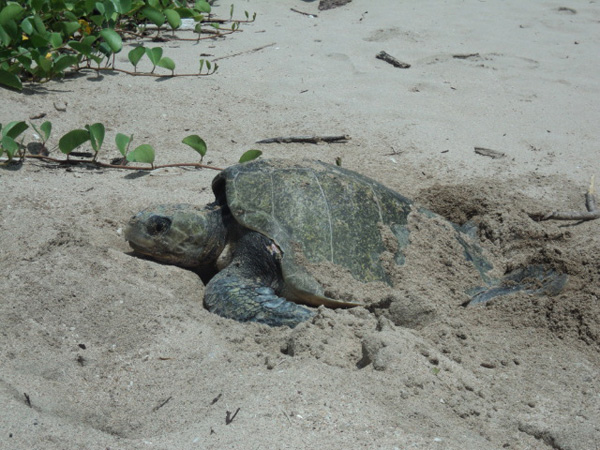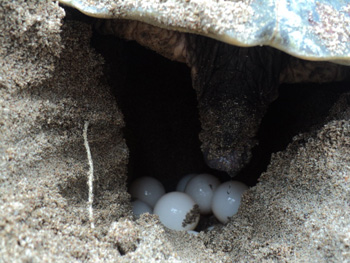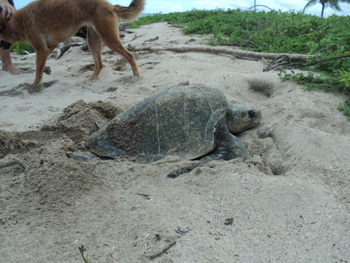There is nothing more picturesque than a sunset horseback ride along the beach and there is no better place than the sandy coast of Nosara. The problem is, not only does this simple and beautiful act have a negative impact on the beach ecosystem, it is also illegal.

Photo by
Gerardo Bolaños
On Friday September 2, members of the community met to discuss the future of the horseback tour industry in Nosara. The menacing clash of economy versus ecology is of constant issue in in the district that is supported largely by sustainable tourism.
While horseback tours are of Nosara’s biggest tourist attractions, Costa Rican federal law prohibits horses from protected beaches. The beaches of Guiones, Pelada, Nosara and Ostional are each designated as wildlife refuges for the purpose of protecting the beach ecosystems and specifically the marine turtles that nest in their sandy shores. The protected areas are the nesting grounds for upwards of one million marine turtles each year. Allowing horses on the beach jeopardizes the integrity of the turtle nests and their eggs.
The concentration of nests and eggs is the highest at Ostional beach, but in order to shelter the marine species’ from synthetic impact even the much smaller populations found on the surrounding beaches of Guiones, Pelada and Nosara must also be protected.
“In a way, the impact on the turtle populations of Guiones and Pelada are much greater, a single nest means a lot more when the population is smaller,” said Marco Johanning of Nosara’s Chamber of Tourism.
In an effort to initiate discourse between wildlife protection groups and horseback tour operators Gerardo Bolaños biologist and sustainability coordinator at Harmony Hotel, hosted an information seminar at the hotel.
“We can no longer ignore the fact that horseback riding on our beaches is not only negatively impacting the environment, but it is illegal,” said Bolaños .
|
|

Photo by
Gerardo Bolaños |
| |
|
| |

Photo by
Gerardo Bolaños |
| |
|
| |

Photo by
Gerardo Bolaños |
More than thirty people showed up for the meeting. In attendance were the tourist police, several horseback tour operators, representatives from MINAE and the Ostional Wildlife Refuge as well as members of the public.
The purpose of the meeting was to discuss the enforcement of the law, the legal and ecological ramifications of horseback riding on the beach. At the meeting commencement a number of the horsemen expressed their frustration about how the law would affect their business.
“They feel like they are being picked on by the tourist police, and MINAE,” said Bolaños, “some left before the meeting ended because they were so angry.”
But nearing the end of the meeting the tone changed as a solution was proposed. The horseback tour companies were encouraged to form an association and apply for a concession. This concession would have to be supported by scientific evidence and approved by the Ostional Wildlife Refuge. It would allow those tour operators involved in the association to use a designated area of the beaches for their tours. In gaining this approval the companies would benefit from higher eco-ratings, and would have exclusive rights to the beaches. A number of those in attendance were enthusiastic about the proposal.
Hans Werner Klossek of Boca Nosara Horseback Tours attended the meeting. He told VON that he has seen a number of changes on the beaches and in the district of Nosara when it comes to tourism over the last ten years. Though he like fellow horsemen and business owners are frustrated by the implementation of the tightened rules he understands the need for change.
“I can understand the purpose and reason behind this change,” said Hans. “I have the utmost respect for nature and the animals; this is why I came to Costa Rica, but we must find a balance, horseback riding belongs to the culture of Costa Rica not just tourism, it is important to the area.”
Hans confirmed that he, along with more than 100 business owners and private horse owners are optimistic about forming an association and making horseback tours on the beach a more sustainable hobby and tourist attraction.
Despite the ecological and legal ramifications of riding horseback on the beaches of Guiones and Pelada, it still occurs on a regular basis. Until the association is formed and a concession is granted the tourist police have committed to cracking down on those who break the law. First time offenders will be granted one warning before their horses are seized and criminal proceedings are applied.
| 
